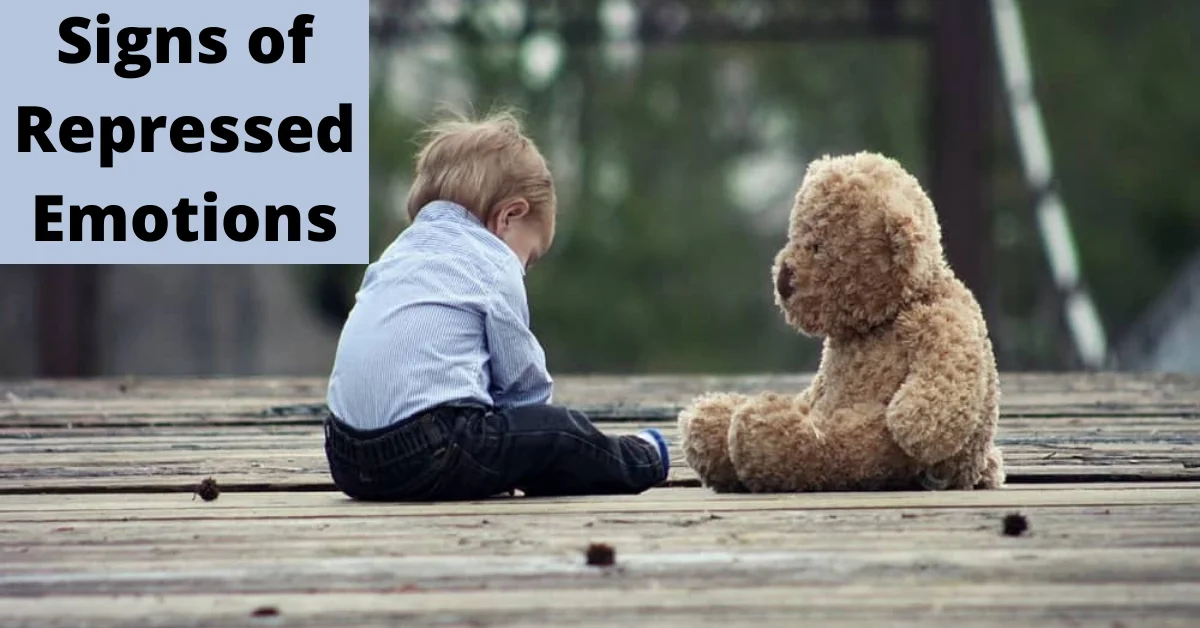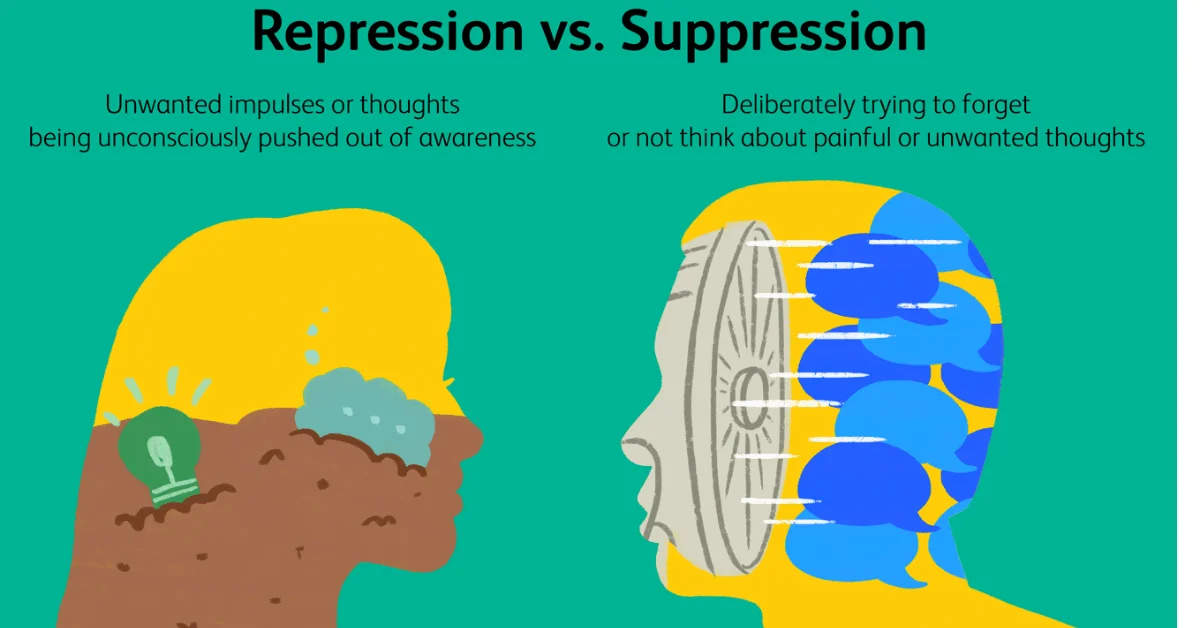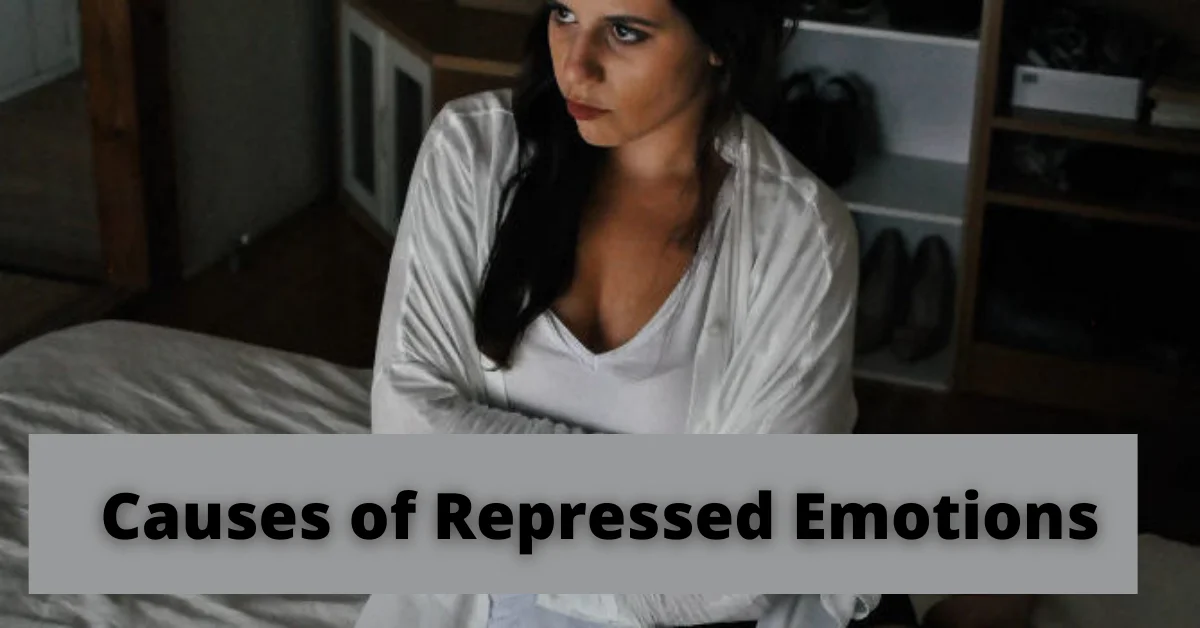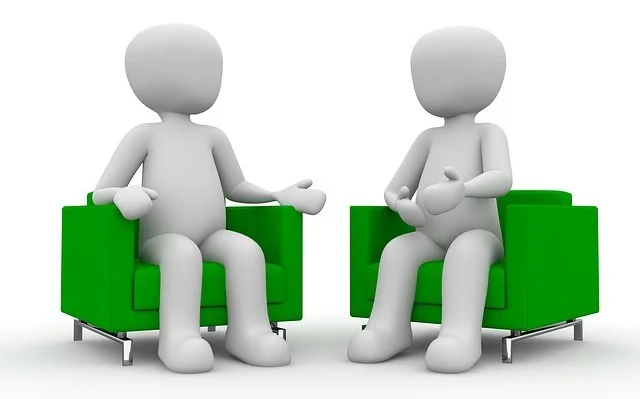Do you ever feel like there are some things that you just don’t want to think about? That maybe if you ignore them, they’ll just go away? This is what’s known as repression. Repressed emotions are those that we push down and try to forget. We do this because they’re too painful or uncomfortable to deal with. Unfortunately, repressed emotions don’t just disappear – they often come back to haunt us in the form of anxiety, depression, or other mental health issues. In this blog post, we will discuss the effects of repression and how it can lead to mental health problems. We will also provide tips for dealing with repressed emotions.
Contents
What Are Repressed Emotions?
 Repressed emotions are feelings that you push down and ignore. These emotions are usually uncomfortable or painful, so you bury them deep inside and try to forget about them. Sometimes you may not even be aware that you’re repressing your emotions. These emotions can include sadness, anger, fear, and shame.
Repressed emotions are feelings that you push down and ignore. These emotions are usually uncomfortable or painful, so you bury them deep inside and try to forget about them. Sometimes you may not even be aware that you’re repressing your emotions. These emotions can include sadness, anger, fear, and shame.
Repressed emotions can have a negative impact on your mental health. When you bottle up your feelings, it can lead to anxiety, depression, and other emotional problems. The good news is that there are ways to deal with repressed emotions. therapies such as counseling or therapy can help you understand and deal with these hidden feelings. If you’re struggling with repressed emotions, don’t hesitate to seek help from a professional.
Signs of Repressed Emotions

There are many signs of repressed emotions. Some of these are:
Difficulty In Showing Emotions
This also means difficulty in experiencing emotions. When people repress their emotions, they find it difficult to show any emotion, either positive or negative. This can be seen as a lack of emotional expression. Sometimes people might seem emotionless or unemotional to others.
Negative Emotions
People who repress their emotions often experience a lot of negative feelings such as sadness, anger, and fear. These emotions tend to be intense and can feel overwhelming.
Physical Symptoms
When you’re repressing your emotions, it can lead to physical symptoms such as headaches, fatigue, chest pain, and even gastrointestinal problems. Some other
Behavioral Changes
People who repress their emotions often exhibit behavioral changes. They might become more withdrawn or isolate themselves from others. They may also have problems with alcohol or drug abuse as a way to cope with their feelings.
Mood Swings
People who repress their emotions often have mood swings. They might go from feeling really sad to being really angry in a short period of time. This can be very confusing and upsetting for those around them.
Numbness or Blankness
These are common symptoms of repressed emotions. When you’re feeling numb or blank, it means that you’re not really feeling anything. This can be a sign that you’re repressing your feelings. Some other can be a feeling of emptiness or a lack of purpose.
Repressed v/s Suppressed Emotions

There can be some confusion between the terms “repressed” and “suppressed.” The key difference is that repressed emotions are buried deep down and ignored, while suppressed emotions are still felt but are pushed away and not dealt with.
These differences can be seen in the way that they are expressed. Repressed emotions often lead to emotional problems such as anxiety and depression, while suppressed emotions can lead to physical problems such as headaches or gastrointestinal problems.
Sometimes people might repress their emotions because they don’t know how to deal with them. Other times, people might suppress their emotions because it’s easier than dealing with the pain that they cause.
If you’re struggling with either suppressed or repressed emotions, there are therapies available to help you. Don’t hesitate to seek help from a professional if you need it.
Causes of Repressed Emotions

There can be many causes of repressed emotions. Some of these include:
Trauma
When you experience a traumatic event, it can be difficult to deal with the emotions that come with it. If you don’t have access to counseling or therapy, you might bury those feelings deep down inside and repress them.
Abuse
If you’ve been abused in any way, it’s natural to want to bury those feelings and pretend they didn’t happen. This is often done in an attempt to protect yourself from further pain.
Parenting
If you’re a parent, you may find yourself repressing your own emotions in order to meet the needs of your children. You might feel like you can’t show weakness or vulnerability around your kids.
Society’s Expectations
Our society often expects people to be happy and cheerful all the time. If you don’t meet these expectations, you might feel like you have to hide your true feelings. This can lead to repression.
Fear
This is a common emotion that can lead to repression. If you’re afraid of something, you might bury those feelings deep down so you don’t have to deal with them. Sometimes people are afraid of their own emotions, which can lead to repression.
Guilt
If you feel guilty about something, you might repress those feelings in order to avoid dealing with the guilt. This can be damaging to both your mental and emotional health. This also includes feeling guilty about things you can’t control.
Therapies For Repressed Emotions

If you’re struggling with repressed emotions, there are therapies available that can help. Some of these therapies include:
Cognitive Behavioral Therapy
This type of therapy focuses on helping you to identify and change the thoughts and beliefs that might be causing your emotional problems. This therapy can also be helpful in teaching you how to deal with your emotions. Sometimes, it can be helpful to work with a therapist who specializes in CBT.
EMDR
EMDR is a type of therapy that uses eye movement and other forms of stimulation to help you process your emotions. This therapy can be very effective in helping you to deal with repressed emotions.
Art Therapy
This type of therapy involves using art as a way to express your feelings. This can be a very helpful way for people who have difficulty expressing their emotions verbally.
Group Therapy
Group therapy can be very beneficial for people who are struggling with repressed emotions. In group therapy, you’ll have the opportunity to share your experiences with others and receive support from them.
Psychodynamic Therapy
This type of therapy focuses on helping you to understand the unconscious thoughts and motivations that might be causing your emotional problems. This type of therapy can be very helpful in releasing repressed emotions.
How To Release Repressed Emotions?

There are many ways to release repressed emotions. Some of these include:
Journaling
This can be a great way to release your feelings and thoughts. Writing in a journal can help you to understand and process your emotions.
Yoga or Meditation
These activities can be helpful in releasing repressed emotions. Yoga and meditation allow you to focus on your breath and relax your body. This can be helpful in releasing the tension that often accompanies repressed emotions.
Identify What You Want
You should also identify what you want in life. Once you know what you want, you can start to take steps to achieve it. This can be a motivating factor in helping you to release your repressed emotions.
Talk To Friend
Talking to a friend about how you’re feeling can be very helpful in releasing repressed emotions. Friends are often willing to listen without judgment and they can provide support and understanding.
Therapy
Working with a therapist is often the best way to release repressed emotions. A therapist can help you to identify and understand the emotions that you’ve been repressing. They can also provide support and guidance as you work through these emotions.
Self-Care
Self-care is essential when you’re dealing with repressed emotions. Taking care of yourself will help you to feel stronger and more capable of handling these emotions. Some self-care strategies include:
- eating healthy foods
- getting enough sleep
- taking time for yourself
- practicing relaxation techniques
- engaging in activities that you enjoy
How To Help Someone With Repressed Emotions?

There are various ways that you can help someone who is struggling with repressed emotions. Some of these include:
Listening Without Judgment
When someone opens up to you about their feelings, it’s important to listen without judgment. Let them know that you care and that you’re there for them. This also helps to build trust.
Providing Support
When someone is struggling with repressed emotions, it can be helpful to provide support. This might include listening to them, providing encouragement, and offering practical assistance.
Encouraging Them To Seek Help
If the person you’re caring for is not interested in seeking help, you can encourage them to do so. You can provide information about various therapies that are available and let them know that you’re available to assist them in any way you can.
Helping Them To Find Therapy
You can help the person you’re caring for to find a therapist who specializes in helping people with repressed emotions. This can be an important step in getting help and beginning to process these emotions.
Encouraging Them To Practice Self-Care
This is an important step in helping someone who is struggling with repressed emotions. Encouraging them to practice self-care can help them to feel stronger and more capable of handling these emotions. Sometimes all it takes is a little bit of support to get started.
Telling Them It’s Okay To Feel
It’s important for the person you’re caring for to know that it’s okay to feel. They shouldn’t feel ashamed or embarrassed about their emotions. Let them know that you support them and that you’re there for them. This also helps to build trust.
Conclusion
In conclusion, repressed emotions can be very harmful to our mental and physical health. It’s important to understand and process these emotions in order to maintain our well-being. There are various ways that we can help someone who is struggling with repressed emotions, including listening without judgment, providing support, and encouraging them to seek help. We should also encourage them to practice self-care in order to feel stronger and more capable of handling their emotions. It’s important for the person you’re caring for to know that it’s okay to feel and that they aren’t alone in this. Thank you for reading this post.
A Word From Therapy Mantra
Your mental health — your psychological, emotional, and social well-being — has an impact on every aspect of your life. Positive mental health essentially allows you to effectively deal with life’s everyday challenges.
Also, at Therapy Care, we have a team of therapists who provide affordable online therapy to assist you with issues such as depression, anxiety, stress, relationship, OCD, LGBTQ, and PTSD. You can take our mental health test. You can also book a free therapy or download our free Android or iOS app.


